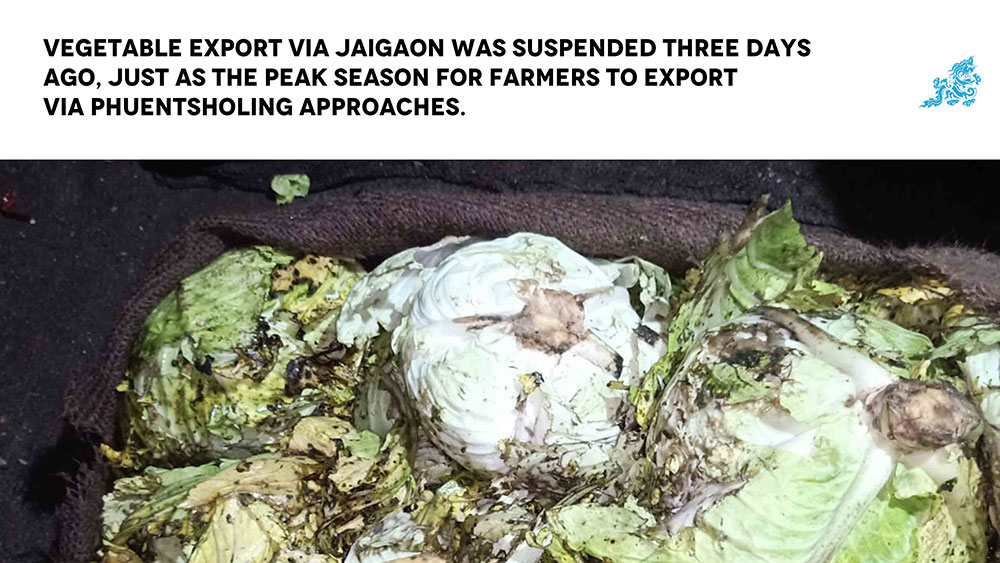 印度 India
印度 India
Vegetable export via Jaigaon stopped at a critical time again

In July last year, vegetable export via Jaigaon came to an abrupt halt when it was the peak time for farmers to export using Phuentsholing as the route.
Farmers were affected.
The problem is repeating this year. It has been three days since export via Jaigaon has been stopped.
Bhutanese suppliers and traders are caught off guard. If a timely intervention doesn’t come soon, it will be the farmers, especially from Chukha and Paro, who will pay the ultimate price.
A trader in Jaigaon said he had 180 bags of cabbages, 27 bags of peas, and 25 bags of potatoes.
“Since it was not allowed, I had to ask the drivers to empty the vehicles and return to Jaigaon,” he said. “I left the vegetables in Phuentsholing.”
The trader said the relevant authorities in Jaigaon said vegetable export was just allowed until January 31 this year. “They asked to get the Bhutanese government papers. They are also saying this has to be solved via a government to government dialogues.”
In October last year, export of potatoes was stopped similarly.
Although many said there were people with vested interests across the border stopping the export, the main cause of the halt was because potato was not listed under India’s import list items.
The issue emerged after the introduction of the Indian Goods and Services Tax (IGST) in 2017. Cardamom was the first agricultural product to face the brunt in July 2017 right after the IGST was introduced.
With the GST implementation, the customs office installed a computerised system called the ICEGATE in Jaigaon and other border towns that link trade to Bhutan.
The system asked for quarantine clearance and the Plant Quarantine Services of India (PQSI) did not issue the clearance for Bhutanese cardamom. The clearance that Bhutan Agriculture and Food Authority (BAFRA) provided was not recognised and export was disrupted.
The government later resolved the matter after raising the issue with India. Along with cardamom, asparagus export was also stopped in 2018.
When potato export resumed last year, areca nut, orange, apple and ginger also were sanctioned for export from Bhutan to India.
It was learned the government had submitted a comprehensive list of numerous products, which the National Plant Protection Organisation (NPPO) in India requested to scale it down to five (potato, areca nut, orange, apple and ginger.)
As of today, Bhutan still has seven more products to include like chilli, beans, cabbage, cauliflower, carrot, peas, and soybeans.
An exporter, Tsenda, said he called the counterpart officials to ask about the issue. “I think they want BAFRA certificates.”
He said it is not clear why the export was stopped suddenly.
Tsenda said the halt happened after the vegetables arrived in Phuentsholing for export.
He said he made a few calls but there was no help.
The chief executive officer (CEO) with the Food Corporation of Bhutan Limited (FCBL), Naiten Wangchuk, said the government has been informed about the issue.
“In fact they have been already working on it,” he said. “They are taking up the issue with the Indian Embassy office.”
FCBL is sending seven staff to different dzongkhags such as Chukha, Paro, Haa, Wangdue, and Bumthang. They are already into quarantine facilities.
“They will facilitate our farmers at the source,” he said.
Although areca nuts, including potatoes and ginger, have been listed under the import list last year, there are many problems related, which needs to be resolved at the government level.
The export of areca nut from Samtse still faced problems, according to a source.
Many are pointing that it was high time the government had learned and did something about such problems.
Source from: Rajesh Rai. (2021). Vegetable export via Jaigaon stopped at a critical time again. Retrieve from: Kuensel(June 22, 2021). https://kuenselonline.com/vegetable-export-via-jaigaon-stopped-at-a-critical-time-again/